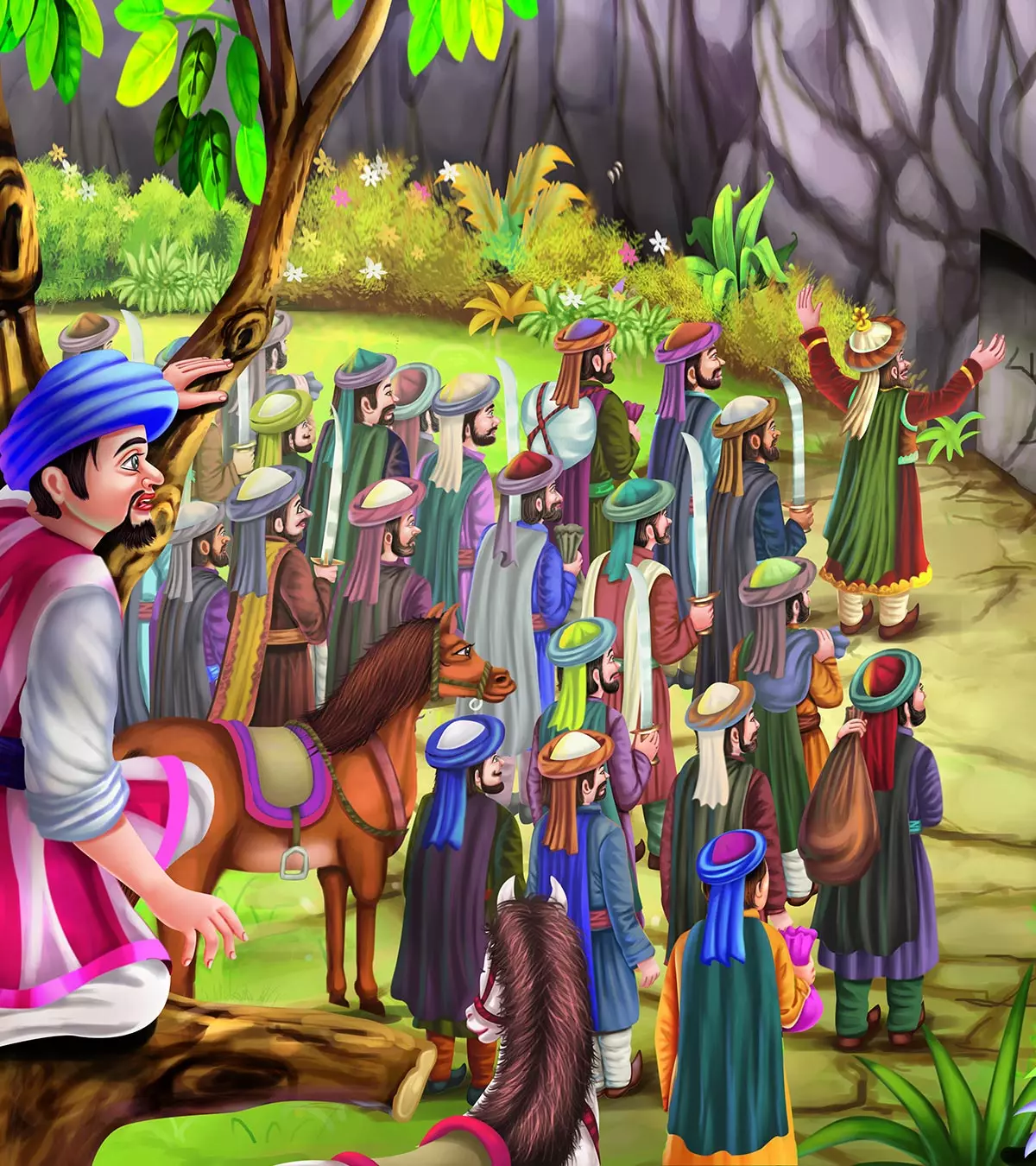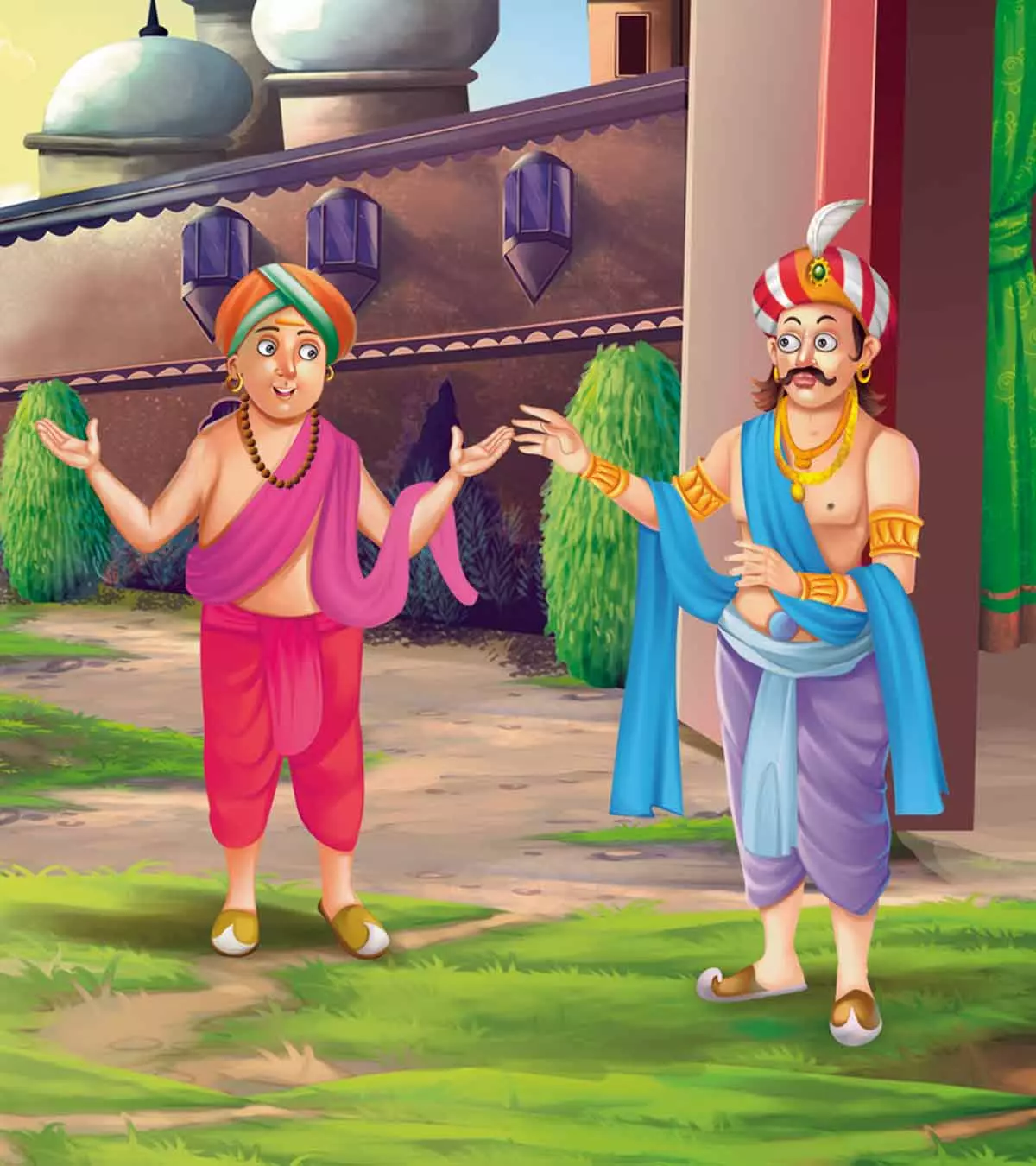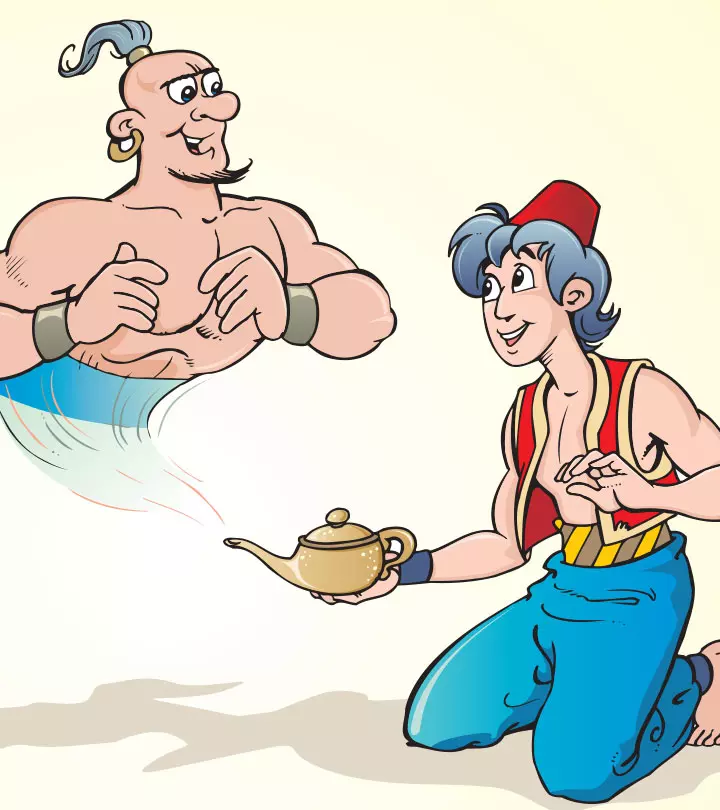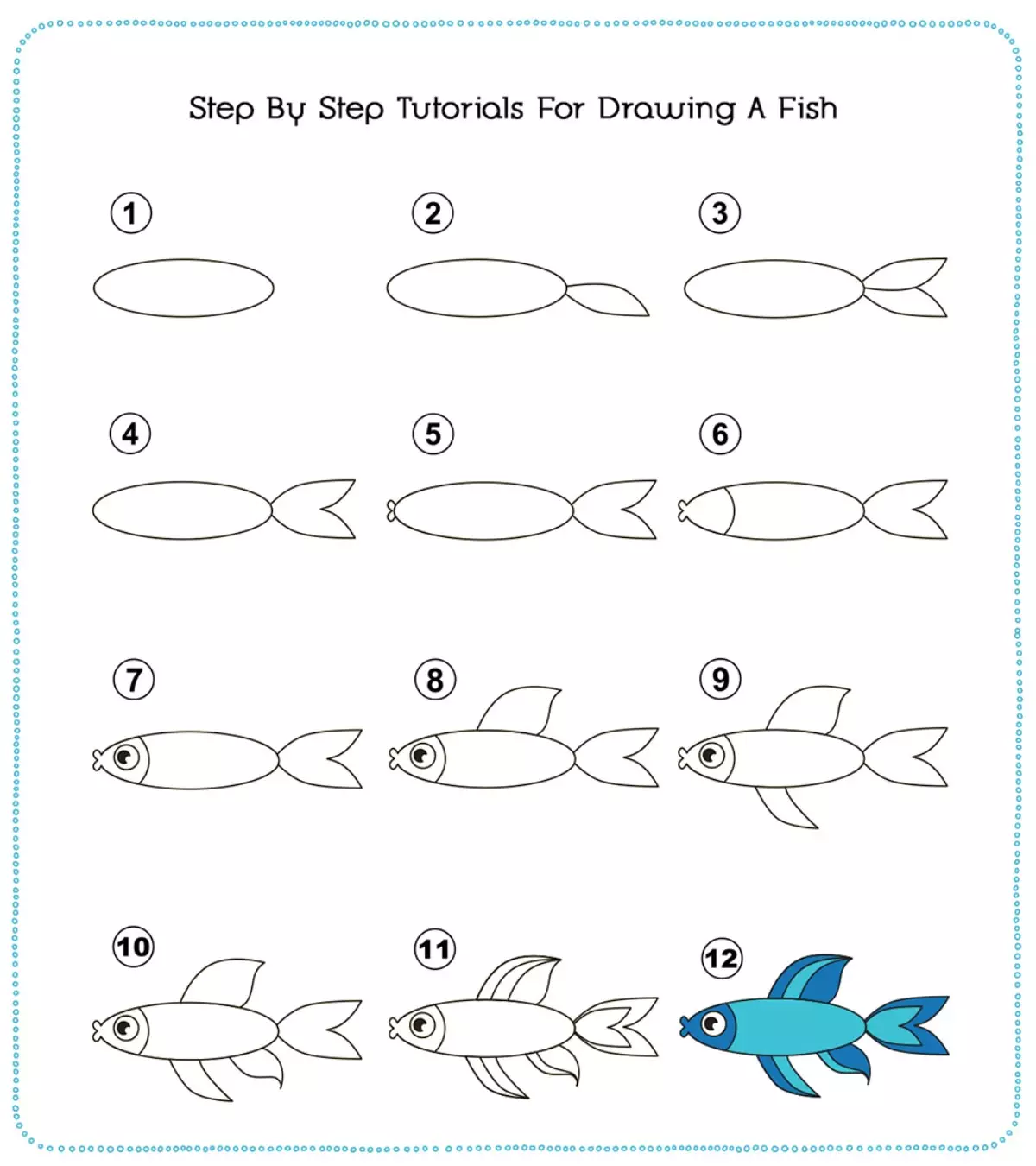
Image: Shutterstock
The Ali Baba and forty thieves story has enthralled us all as children. There are over 1,000 stories in Arabian Nights, but how many can you recall?
Every adventure story in the One Thousand and One Nights collection is unique and offers a lesson for us. However, we only recall a few.
One of these is Ali Baba and the Forty Thieves. The well-known tale forms part of Middle Eastern folklore and has inspired numerous films, plays, and musicals. Its messages about greed and wit continue to captivate audiences across cultures and eras. You might wish to read this story to your children if you enjoyed it. The story’s plot is so exciting that it draws you into the story. Here is a condensed version of the story for your little one to enjoy.
Key Pointers
- Ali Baba and the Forty Thieves imparts a lesson against greed.
- The story teaches children the importance of resourcefulness and presence of mind.
- The story also touches on the concept of karma, making it a wholesome story for the little curious minds.
Ali Baba And The Forty Thieves Story Summary
Once upon a time, there lived two brothers named Cassim (or Kasim) and Alibaba, who were sons of a merchant and had an equal amount of inheritance. While Cassim married a rich lady and became a wealthy merchant, Alibaba married a poor, humble woman and lived the life of a woodcutter.
The discovery of the cave
One day, Alibaba goes deep into the forest for some good quality wood. There, he chances upon a cave owned by a gang of 40 thieves. He watches from behind a tree and learns that the cave is magically protected. He hears the leader of the thieves say a magical word to open and close the cave.
Alibaba waits until the thieves leave the cave and then goes to it. He says, “Open Sesame”, the magic words that the leader says and the cave opens. Inside, Alibaba finds mounds of gold jewels, coins, and other precious artifacts. He is awed by the treasure but is careful enough not to leave a trace of his visit. He picks up a small bag of coins and leaves the cave. Once outside, he utters the magical words “Close Sesame” to close the cave.
Greedy Brother
Alibaba tells his wife about the cave and the thieves. They borrow weighing scales from Cassim to measure the wealth they have. Being sneaky, Cassim’s wife applies some wax under one of the scales to know what grain her brother-in-law has acquired. When the weighing scales are returned, she is shocked to see a gold coin stuck to the bottom.
After a lot of prodding by his wife, Cassim asks Alibaba about the money. He forces his brother into revealing the mystery behind the gold coins. Alibaba tells him everything, but after convincing Cassim not to reveal the secret to anyone, including his wife. Cassim agrees to it and goes to the cave, taking a donkey along, hoping to bring back as much wealth as possible.
He opens the door and gets excited at the sight of all the gold. He quickly fills his bags with as many gold coins and jewelry as possible. But in his excitement, he forgets the magical password to open and closes the cave door. The cunning thieves return and find Cassim in the cave. They kill him and hang him outside the cave door, as a warning to anyone who might try to steal from them again.
Keeping A Secret
When Cassim does not return from the cave, his worried wife senses danger and approaches Alibaba who goes to the cave and finds his brother’s body that is cut into four pieces and hung outside the cave. Heartbroken, Alibaba takes his brother’s body down and returns home. He seeks the help of Morgiana, a clever slave girl from Cassim’s house, to make Cassim’s death look natural.
First, Morgiana goes to the pharmacist in the town and gets medicine, claiming that Cassim is gravely ill. She then finds an old tailor, blindfolds him, and takes him to Alibaba’s house where he works on Cassim’s body. He skillfully stitches the four pieces of the body overnight.
Alibaba and his family give Cassim a proper burial, without arousing suspicion.
The Thieves Come To Town
On returning, the thieves find that Cassim’s body is gone. The leader, worried that someone else knows the cave’s secret, sends one of his men to the town to inquire. The thief talks to different people in the village and comes across Baba Mustafa, who boasts that he is the best tailor in the area as he just came back from sewing a man’s body together. On further inquiry and coaxing, the tailor agrees to lead the thief to Alibaba’s house.
He gets blindfolded again and retraces his steps to the house. The thief marks the door with a symbol and goes back to get the rest of his gang. Morgiana sees this and marks all the other houses with the same symbol. The next day, the leader and the thieves return to the town only to find all the houses marked the same. The leader kills the thief and assigns the job to another.
The second thief manages to find Alibaba’s house and chips the wall of the house, as a mark. Morgiana foils the thief’s plan again, by cracking the walls of all the other houses in the neighborhood. Unable to find the house yet again, the leader kills the second thief as well and decides to complete the task himself.
A New Oil Merchant
The leader of the gang memorizes the exteriors of Alibaba’s house and returns next day, posing as an oil merchant. The leader comes to town with 38 donkeys carrying a barrel each, with one barrel containing oil and the remaining hiding the 37 thieves. He requests Alibaba’s hospitality and tells him that he has 38 barrels of oil for trade.
Morgiana once again learns about the plan of the thieves and kills the 37 thieves by pouring hot oil into the 37 barrels. At midnight, the leader comes to wake the others and finds them all dead. Though afraid, he makes an escape.
On learning about how Morgiana killed the thieves, Alibaba sets the slave-girl free as a reward. Alibaba and Morgiana bury the dead bodies, and Morgiana continues living with Alibaba and his family.
A Happy Ending
A few months later, the leader of the forty thieves comes back to town as a merchant and befriends Alibaba’s son to get his revenge. Alibaba’s son invites the merchant home for dinner, where the leader plans to kill Alibaba and his family. Morgiana, who is the only one to realize that the leader of the thieves is among them, performs a dagger dance at the dinner.
While dancing, she plunges the knife into the chief’s heart and kills him. Alibaba is furious at Morgiana for killing the guest. But on learning why Morgiana killed him, he is impressed by her intelligence and quick thinking. Grateful that she saved his son’s life , Alibaba makes her a part of his family by getting her married to his son.
One year later, Alibaba decides to visit the cave again as there were no robbers left from the gang of forty. As he reaches the cave, he spells the magic word “Open Sesame” to open the cave door. He feels relieved that the cave had remained untouched since the captain of the thieves left the place and there was no robbery.
Alibaba gathers as much gold as he can and leaves for his town. Later, he shares the story of the secret cave with his son and its inheritance is handed down to his children and grandchildren.
In the end, everyone is happy except the thieves and the greedy brother.
A Story For All
The story of Alibaba and the Forty Thieves was originally written in Arabic. The book has been translated into several languages such as Hindi, English, Urdu, and more, and the story was adapted to make plays, movies, and even musicals in different languages.
A musical based on the story was made in the Soviet Union, while movies based on this Arabian Night story have been made in English, French, Turkish, Hindi, and other Indian languages. It is one of the most engaging moral stories for kids that encourage readers to develop positive traits such as quick and smart thinking. The story also tells us what happens when greed increases in a person.
Frequently Asked Questions
1. Is the story “Ali Baba and 40 thieves” real?
No, “Ali Baba and 40 thieves” is a famous fictional Arabian folk story from the storybook “The Thousand and One Nights.”
2. How different were Ali Baba and his brother?
Ali Baba was a poor and honest man who married a poor woman and lived as a woodcutter. However, his brother “Cassim” was a greedy person who married a rich woman for wealth.
3. What is the meaning of Ali Baba?
Because of the story “Ali Baba and 40 thieves,” the name Ali Baba means ‘a fortunate person,’ especially one who acquires a great fortune by chance or luck.
4. Who wrote Alibaba and the 40 thieves?
“Alibaba and 40 Thieves” is folklore with no known author; however, later, many authors worldwide, including Antoine Galland and Albert Goodwin, translated and rewritten the story.
5. Are Alibaba and Aladdin the same thing?
No, Ali Baba and Aladdin are the fictional characters of different Arabian stories from The Book of One Thousand and One Nights.
6. What is the moral of the story Ali Baba and the Forty Thieves?
The story teaches that greed can lead to trouble, while wisdom and resourcefulness are key to overcoming obstacles. In the story, Ali Baba represents resourcefulness, Cassim embodies greed, and Morgiana represents loyalty and intelligence.
Illustration: The Story Of &039Ali Baba And The Forty Thieves&039 For Your Kids

Image: Stable Diffusion/MomJunction Design Team
In a nutshell, Alibaba and The Forty Thieves is a fantastic fable that you should read out to your children. So what are you waiting for?
Grab a copy of Alibaba and the Forty Thieves today, or read our abridged version of the story here. In any case, do tell us how your kids liked it!
Relive the classic tale of Ali Baba And The Forty Thieves through this animated video. Discover the power of the magic phrase and the wit of Ali Baba.
Community Experiences
Join the conversation and become a part of our nurturing community! Share your stories, experiences, and insights to connect with fellow parents.
Read full bio of Elisabeth Daly
Read full bio of Harshita Makvana
Read full bio of Deepa Thomas
















